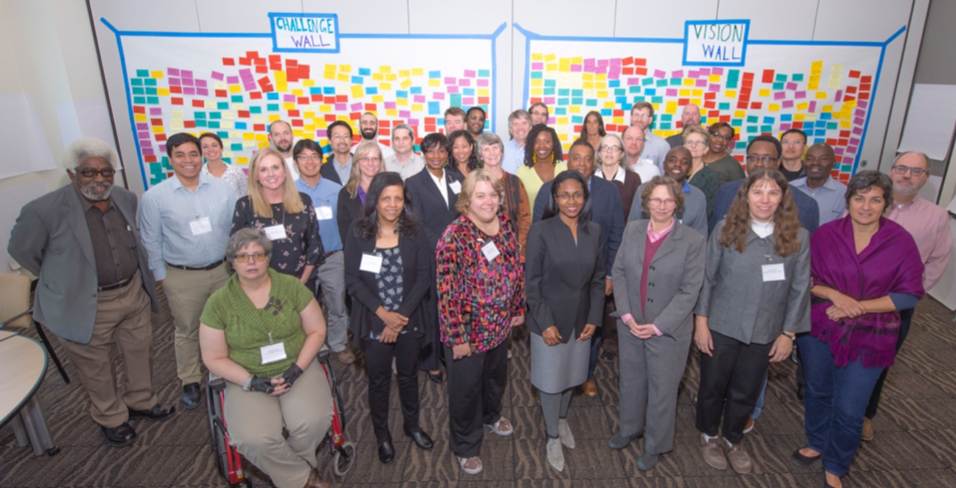
The goal of this series is to garner community input into pathways for keeping data science as a discipline broadly inclusive. We seek input from data science programs in any region across the nation, either traditional or alternative, and from a range of institution types including minority-serving institutions, community colleges, liberal arts colleges, tribal colleges, universities, and industry partners.
The series consists of webinars, workshops, and programs exploring the future of data science education and workforce at institutions of higher learning that are primarily teaching-focused.
Program committee members were chosen to represent a broad spectrum of communities with a diversity of geography (West, Northeast, Midwest, and South), disciplines (CS, Math, Stats, other domains), as well as institution type (MSI’s, CC’s, 4-year colleges, tribal colleges, and universities). The series’ Principal Investigator is Dr. Renata Rawlings-Goss and it was co-sponsored by the National Science Foundation, the South Big Data Hub, and the Georgia Tech Institute for Data Engineering and Science.
Webinar 1: Data Science Education Programs in Traditional Contexts | Aug 31, 2017 | Virtual
This webinar will highlight data science undergraduate programs that have been implemented at teaching institutions, community colleges, universities, minority-serving institutions, and more. The goal is to provide case studies about data science programs being developed by primarily undergraduate serving institutions. Such institutions are crucial connectors in the establishment of a robust data science pipeline and workforce but they can have different constraints than large research-focused institutions when developing data science education programming. You can view the webinar by clicking the link above or visiting the South Big Data Hub YouTube channel.
Webinar 2: Alternative Avenues for Development of Data Science Education Capacity | Sept 22, 2017 |Virtual
This webinar will highlight efforts that build data science education capacity outside of the context of tradition curricular program development. Example efforts include integration of data science into courses and curricula outside of the traditional CS/math/stats context (i.e. Arts and Humanities), expansion of capacity by integration of third party or shared resources (i.e. MOOCs and open source educational resources) into curricula, and additional educational options outside of traditional courses (i.e. Faculty training, Data Science for Social Good Programs, and Bootcamps). You can view the webinar by clicking the link above or visiting the South Big Data Hub YouTube channel.
Workshop: Negotiating the Digital and Data Divide | October 31, 2017 | Atlanta, GA
As the movement to develop data science programs grows, a gap appears to be forming that separates the research institutions from primarily undergraduate-focused institutions (i.e. teaching institutions, community colleges, minority-serving institutions, etc.). This workshop will explore the Data Divide issue by bringing together stakeholders from teaching institutions, community colleges, tribal colleges, and minority-serving institutions to discuss challenges related to capacity building and capability. The goal of the workshop is to enable researchers and educators to understand and to begin to address questions on how to best prepare their institutions to teach the data science students of 2025 and to prepare them for the “data-intensive” and “data-enabled” society, economy, and job market of 2025 and beyond. Participation in the workshop was by invitation only. View Final Report
Webinar 3: Big Picture for a Big Data Science Education Network – Next Steps| Jan 16, 2018 |Virtual
This webinar highlighted report outcomes from the Keeping Data Science Broad Series as well as next steps, open projects, programs, and opportunities for you to get involved in the Data Science Education Network today.
